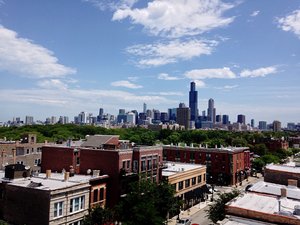Yogi Berra once said it's hard to make predictions, especially about the future. And pollsters and election forecasters are feeling just how difficult predicting the future is after Donald Trump's massive political upset over Hillary Clinton.
Polls are not designed to to tell you what the undecided voters are going to do
Nearly every poll predicted a victory for Clinton on election night, with varying degrees of certainty. Fivethirtyeight.com had Clinton's chances around 71% on election day. The New York Times was more than 80% confident in a Clinton victory. The Princeton Election Consortium was at 99%.
But perhaps no election forecasting model was more confident than Election Analytics, a University of Illinois data analytics team made up of undergraduate and grad students led by Illinois computer science professor Sheldon Jacobson. On October 10, Election Analytics' model had Clinton at 100% probability of winning the presidency. (Launched in 2008, Election Analytics correctly predicted 49 out of 50 states in both the '08 and '12 elections. Its forecasting is based on if the election were held on that day, and had Clinton at 99.2% at 10 a.m. Tuesday.)
So, what went wrong?
The issue, Jacobson said, is that there was a massive number of undecided voters this election, which apparently mostly swung in the direction of Trump. Political pollsters and election forecasters can only work off of the data they have (i.e. likely voters who say who they plan to vote for), he said, and this year polled voters who hadn't indicated their preferences mainly went with Trump.
"Polls are not designed to to tell you what the undecided voters are going to do," Jacobson said. "They’re only designed to tell you what people who are committed are going to do, and that assumes they actually tell you who they are really going to vote for."
"What we didn't know was what the undecided voters were going to do," he added. "We know exactly what they did now. They swung madly to Trump, beyond what anybody could expect."
Jacobson said typical elections see between 2 and 5% of undecided voters around election day. Some polls this year were showing undecided voters in the low double digits, he said.
"The undecided voters obviously had an enormous impact, and the pollsters cannot figure out what's going on in people's minds ... We can only do as much as the data allows us to do," he said.
There are undecided voters, and then there are voters who may have been reluctant to identify as Trump supporters when polled, according to Arie Kapteyn, director of the University of Southern California’s Dornsife Center for Economic and Social Research.
"There's some suggestion that Clinton supporters are more likely to say they're a Clinton supporter than Trump supporters are to say they're a Trump supporter," Kapteyn told USA Today.
Jacobson said this explanation is possible, but has yet to see clear data that backs this up. But if someone was polled and they were going to withhold their voting plans, they'd respond as "undecided," he said.
So, what does this mean for the future of polling and election forecasting? Jacobson said now is "exactly the right time to embrace data and polling and analytics," adding that people will take what happened in 2016 and learn from it.
"Were using the best available information to provide scenarios," he said. "When you put yourself out there at the public level and you're bold enough to give people information, sometimes you’re going to be wrong, even when you’re doing all the right things."
Creative Commons Image








